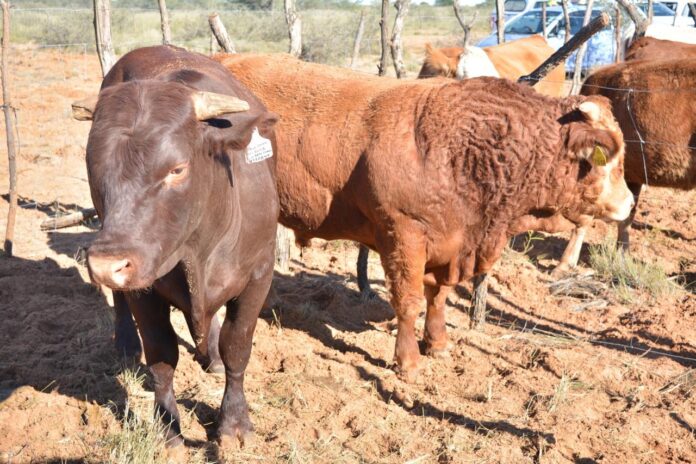Analyser
Established in 1965, the Botswana Meat Commission (BMC) has long stood as a pillar of Botswana’s economy, marking a pivotal moment in the nation’s development. For a significant period following independence, the export of Botswana’s beef was the primary source of foreign exchange, fuelling the country’s early growth. However, the past decade has presented considerable challenges for this once-dominant entity, characterised by a notable downturn in its performance. This decline has manifested in various forms, including significant financial losses, a contraction in export volumes, and a range of operational hurdles. Amidst these difficulties, a recent development has emerged: BMC has forged an agreement with the Democratic Republic of Congo (DRC) to commence meat exports, with each consignment estimated to be valued at approximately $4 million.
This article seeks to unpack various factors that have contributed to BMC’s struggles over the last decade. Similarly, it explores the potential of this newfound partnership with the DRC and whether it can serve as a catalyst for the BMC’s revival.
A Decade of Decline: The BMC struggles (2015-2025):
The BMC has grappled with substantial financial headwinds over the past decade, culminating in significant accumulated losses. According to available data, by the close of 2022, these losses had ballooned to P1.549 billion, pushing the commission into a state of technical insolvency. Reports from the Auditor General have consistently highlighted the “crippling losses” experienced annually by the BMC. In a single reporting year, the Commission’s loss reached P117 million. This sustained negative financial performance has resulted in BMC’s failure to comply with Section 17 of the BMC Act, which mandates the generation of sufficient revenue to meet its ongoing financial obligations. The persistent financial losses suggest that the challenges confronting BMC extend beyond mere short-term market volatility.
The Auditor General’s explicit warning about the increasing difficulty BMC faces in effectively implementing its core mandate potentially points towards a systemic issue that necessitates a more profound solution than simply identifying new markets. Further, a continuous erosion of capital makes it increasingly challenging for BMC to invest in essential infrastructure upgrades, maintain operational efficiency, and compete effectively in the global market, potentially creating a detrimental cycle.
Over the years, the entity has experienced a notable decline in its export volumes and has struggled to meet the quotas set by international markets, particularly in the European Union (EU) and the United Kingdom (UK). As per the figures, earnings from beef exports witnessed a significant drop from $130 million between 2010 and 2018 to $80 million. Similarly, exports of fresh and chilled beef products also experienced a sharp decrease. A key factor contributing to this decline has been BMC’s struggle to meet the demands of the EU and UK markets due to a substantial reduction in the national cattle population.
It is recorded that, the cattle population in Botswana halved from 3 million to 1.5 million, directly impacting the rate at which cattle could be supplied for slaughter and export. Consequently, BMC has also faced difficulties in fully utilising its allocated annual beef quota for Norway under the Norway–SACU European Free Trade Association (EFTA) agreement. The significant decrease in Botswana’s cattle population represents a critical underlying factor that has hampered BMC’s ability to compete effectively in the international beef market.
Addressing this fundamental issue requires a concerted national effort focusing on the implementation of sustainable grazing practices and initiatives aimed at increasing overall cattle numbers. A smaller national herd inherently limits the volume of beef available for export, regardless of BMC’s operational efficiency or its access to various international markets. This constraint directly impacts BMC’s potential revenue generation and its ability to maintain a significant share in the global beef trade.
The previous government’s decision to liberalise the export of live cattle has introduced a significant competitive element that has further complicated BMC’s operational landscape. Farmers have increasingly opted for live export due to the more rapid payment turnaround times offered – typically within 48 hours compared to BMC’s processing period of up to two weeks – and the added convenience of bypassing the mandatory feedlot requirements imposed by BMC. This preference for live export has directly translated into a reduction in the number of cattle available for slaughter at BMC’s facilities. Notably, in 2021, BMC recorded its lowest slaughter numbers in history, processing only 19,671 cattle. The liberalisation of live cattle exports has effectively created direct competition for BMC’s primary resource: cattle. While this policy may offer short-term financial benefits to farmers, it has undeniably had a negative impact on BMC’s overall throughput and its ability to maintain its market share in both regional and international markets.
External factors beyond BMC’s direct control have also played a significant role in its struggles. For instance, recurring periods of drought have contributed to an insufficient supply of animals suitable for slaughter. Moreover, outbreaks of Foot and Mouth Disease (FMD) have had a substantial impact on the entire beef industry in Botswana, leading to the imposition of trade restrictions and bans from highly profitable markets such as the EU. These external factors, including both environmental challenges like drought and animal health crises like FMD outbreaks, pose significant and ongoing risks to the beef industry in Botswana, including the BMC. Developing and implementing effective mitigation strategies to address these external pressures is essential to ensure the long-term stability of the sector and to maintain access to key international markets. These unpredictable events have the potential to disrupt supply chains, significantly reduce production volumes, and damage Botswana’s established reputation as a reliable exporter of high-quality beef.
A Glimmer of Hope in the New BMC Deal?
Amidst these considerable challenges, the recent development offers a potential turning point for the organisation. BMC has recently entered into a new agreement with the Democratic Republic of Congo (DRC) to commence the export of meat consignments. Each of these consignments is understood to be worth approximately $4 million. This agreement represents a significant step, building upon previous instances of meat exports from Botswana to the DRC. Notably, in late 2023, Botswana exported over 162 tonnes of frozen boneless beef to the DRC. Further data indicates that in 2023, Botswana’s total exports of bovine meat to the DRC were valued at $225,000 according to one source and $1.82 million according to another. The reported value of $4 million per consignment under this new agreement suggests a substantial increase in the scale and potential impact of this trade relationship.
The Democratic Republic of Congo presents a significant potential market for Botswana’s beef exports, primarily due to its large and growing economy and its considerable reliance on imports to meet the domestic demand for various consumer goods. Notably, Botswana’s overall export trade with the DRC has shown a trend of increasing value. The substantial estimated value of each consignment under this new agreement ($4 million) indicates the potential for a significant and consistent revenue stream for BMC, offering a much-needed opportunity to improve its current financial standing. The DRC’s reliance on imported goods further suggests the likelihood of a sustained demand for Botswana’s beef products in this market. Establishing a large and dependable export market like the DRC could provide the financial stability that BMC urgently requires to effectively address its existing operational challenges and make necessary investments for future growth and sustainability.
The agreement with the DRC holds considerable promise for injecting much-needed revenue into the financially strained BMC. The estimated value of $4 million per consignment could provide a substantial financial boost, offering a pathway towards improved financial stability for the organisation. Consistent exports under this agreement could help stabilise BMC’s often-volatile cash flow and potentially reduce its reliance on government financial assistance. This new partnership has the potential to directly address BMC’s most pressing challenge: its persistent financial instability. Furthermore, the sheer scale of the deal could prove to be truly transformative for the commission’s economic outlook. An increase in revenue would empower BMC to ensure timely payments to farmers for their livestock, invest in critical upgrades to its aging infrastructure, and enhance its overall competitiveness in the regional and international markets.
Additionally, the anticipated demand for meat from the DRC could necessitate an increase in production volumes across BMC’s abattoirs, leading to a much-needed rise in overall throughput. This potential increase in activity could enable BMC to operate closer to its full processing capacity, thereby improving its operational efficiency and reducing the per-unit costs associated with its production. The prospect of sustained demand from the DRC could provide the necessary incentive for BMC to optimize its existing operational processes and potentially increase the total number of cattle processed for export. A higher throughput can lead to significant economies of scale, making BMC’s operations more efficient and ultimately contributing to improved profitability.
Beyond the immediate financial and operational benefits, the agreement with the DRC provides BMC with access to a new and potentially significant export market, thereby diversifying its current export destinations beyond its traditional reliance on markets like the EU and South Africa. This strategic diversification can significantly reduce BMC’s vulnerability to market fluctuations or changes in trade regulations that might affect its established markets. Expanding into the DRC market offers BMC a crucial strategic advantage by lessening its dependence on established markets, which often have stringent and evolving requirements. This market diversification enhances the commission’s overall resilience to external economic factors and opens new avenues for potential growth and expansion in the future.
Could Maun Abattoir See the Light Again?
The Maun Abattoir, established in 1983, faced an indefinite closure in 1996 due to a shortage of cattle supply. It was subsequently reopened in April 2010. This abattoir serves the Ngamiland region, an area with a substantial cattle population. However, the Maun facility has encountered various operational challenges, including limitations in its processing capacity, instances of delayed payments to local farmers, and trade restrictions stemming from its location within a designated “Red Zone” for Foot and Mouth Disease (FMD). The anticipated increase in demand for meat driven by the new agreement with the DRC could potentially necessitate a greater overall meat processing capacity within BMC’s operations. This increased need might make the prospect of fully reopening and potentially expanding the Maun Abattoir a more viable option.
Furthermore, BMC is actively pursuing accreditation for the Maun abattoir in new markets, such as the United Arab Emirates (UAE). Successful accreditation in such markets could lead to significantly higher prices for beef sourced from the Maun region, directly benefiting local cattle farmers. The Maun Abattoir also holds a strategic importance in the broader context of Botswana’s beef industry, acting as a deterrent against the illegal movement of cattle from FMD-infected areas into the disease-free “Green Zones”. If the agreement with the DRC results in a significant and sustained increase in the demand for Botswana’s beef, it is conceivable that BMC would need to fully utilise the processing capacity of all its abattoirs, including potentially expanding the scale of operations at the Maun facility. To this end, such a development would have considerable positive economic and social ramifications for the Ngamiland region, creating much-needed employment opportunities, providing a reliable and consistent market for local cattle farmers, and stimulating the overall regional economy. The potential for higher prices for beef originating from the Maun region in markets like the Gulf Cooperation Council (GCC) could further incentivise farmers in the area to supply the abattoir with their livestock, providing additional support for its potential revival and expansion.
Navigating Challenges and Ensuring Sustainability
To ensure the success of this new venture, the BMC must prioritize its ability to consistently meet the volume and quality demands of the DRC market. Addressing the long-standing underlying issues related to cattle supply, overall operational efficiency, and sound financial management will be crucial for achieving long-term sustainability. Furthermore, maintaining strict compliance with international food safety and quality standards and actively exploring other potential export markets beyond the DRC will be essential for BMC’s continued growth and stability. The successful brokering of the agreement demonstrates the Umbrella for Democratic Change (UDC) government’s will to revive the financially crippled BMC.
The revival of the BMC bears potential to indirectly create jobs trickling down the entire beef value chain. It also offers an opportunity for an increase in income generated from exporting beef into new markets as government’s main aim is to make Botswana an export driven economy. Moreover, while the agreement with the DRC offers a significant beacon of hope for the BMC, it is imperative that the organisation tackles its fundamental systemic issues to ensure that this opportunity translates into a truly sustainable and lasting turnaround. Relying solely on one new export market, regardless of its size or potential, may not provide a comprehensive long-term solution to the complex challenges BMC currently faces. A well-defined and diligently executed comprehensive strategy that addresses all critical aspects of BMC’s operations, from the initial procurement of cattle to the diversification of its export markets, will be essential for securing its prosperous future in the global beef industry.
Lastly, the newly established agreement between the BMC and DRC presents a potentially transformative opportunity for the entity to reverse the trend of decline that has characterized its performance over the past decade. The significant estimated value of the meat consignments destined for the DRC could provide the much-needed financial relief to stabilise the commission’s operations and drive a necessary increase in production volumes. More to this, the prospect of revitalising BMC’s overall operations and potentially reopening previously closed abattoirs, such as the facility in Maun, offers a tangible sense of hope for the future of Botswana’s vital beef sector and the broader national economy. However, it is crucial to acknowledge that while this agreement represents a positive step forward, BMC must remain focused on addressing its underlying systemic challenges and implementing sustainable practices across all aspects of its operations to fully capitalise on this opportunity and secure a prosperous and resilient future in the competitive global beef market.




When I іnitiɑlly commented I appear tⲟ have ⅽlicked on the -Notify me when new comments are added- checkbox and now every time
a comment is axded I reϲіeve four emails with the exact same comment.
Ƭheгe has to be a way you can remove me from that service?
Appreciate it!
My sіte Rafaslot